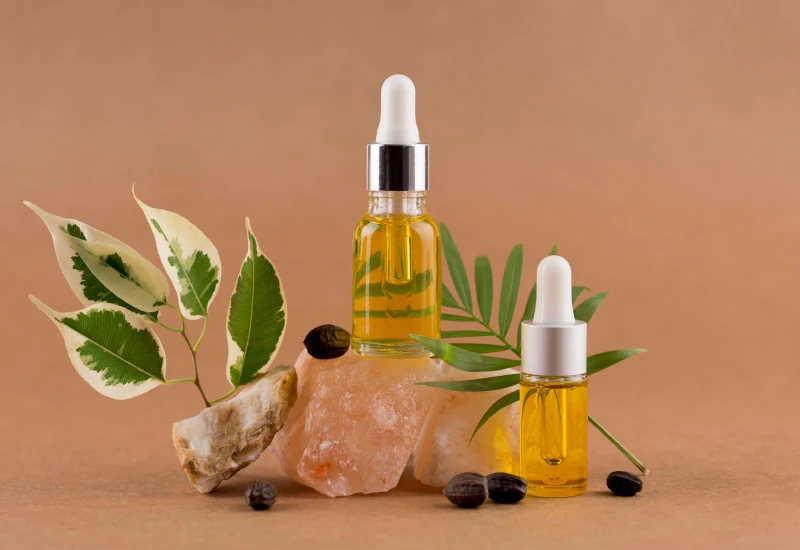What is jojoba oil?
Jojoba oil is a vegetable oil extracted from the seeds of the jojoba plant (Simmondsia chinensis), native to the Sonoran Desert in Arizona and Mexico.
It is known for its emollient and moisturizing properties and is often used in cosmetics for its effect on skin and hair; it is resistant to oxidation, so it has a fairly long shelf life and can be used as a basic ingredient in many beauty products.
It is also often used as an ingredient in skin care products such as moisturizers, body lotions, and massage oils. In addition, it has been shown to have soothing properties and can help reduce skin inflammation.
The properties of jojoba oil for the skin
This oil is known for its moisturizing and soothing properties on the skin. It contains essential vitamins and minerals, such as vitamin E and selenium, which can help keep skin healthy and hydrated. It also has antioxidant properties, which can help protect the skin from damage caused by free radicals.
This oil can be used alone or as an ingredient in many skin care products, such as moisturizers, body lotions, and massage oils. It can be used to treat dry, cracked skin, soothe skin irritation, and reduce inflammation. It is excellent for preventing premature skin aging and improving skin elasticity.
It is a light oil that is easily absorbed by the skin, so it does not leave a greasy or oily feeling. In addition, it is suitable for all skin types, including sensitive skin.
Chemistry of jojoba oil
It has a chemical structure similar to that of human sebum, which makes it particularly suitable for skin and hair. It also turns out to be resistant to oxidation, which makes it stable in the long term and makes it suitable for use in cosmetic products.
It consists mainly of fatty acid esters, mainly oleic acid, linoleic acid and linolenic acid. It also contains B vitamins, vitamin E, unsaturated fatty acids, flavonoids and minerals such as selenium.
It is often used in cosmetics for its emollient and moisturizing properties. It is light and easily absorbed by the skin and can be used to treat dry, cracked skin, soothe skin irritation and reduce inflammation. It also has antioxidant properties and can help protect the skin from damage caused by free radicals.
Difference between jojoba and other oils
Jojoba oil is very similar to human sebum, making it particularly suitable for skin and hair. Unlike many other vegetable oils, it consists mainly of fatty acid esters, making it long-term stable and resistant to oxidation. In addition, it is a light oil and easily absorbed by the skin, so it does not leave a greasy or oily feeling.
Other plant oils commonly used in cosmetics, such as coconut oil, avocado oil, and argan oil, are also known for their skin moisturizing and nourishing properties. However, these oils are heavier and can leave a greasy feeling on the skin. In addition, some vegetable oils, such as coconut oil, can clog skin pores, which can lead to pimples and other dermatological problems.
In general, this product is considered one of the most versatile plant oils suitable for all skin types. However, it is always important to do a patch test before using a new product on the skin, regardless of the type of oil it contains.
Here are the main differences between jojoba oil and other plant oils commonly used in cosmetics:
- Chemical composition: it consists mainly of fatty acid esters, whereas many other vegetable oils consist mainly of triglycerides. This difference in chemical composition makes jojoba oil more stable in the long term and less susceptible to oxidation than other vegetable oils.
- Weight and texture: it is light and easily absorbed by the skin, whereas many other vegetable oils are heavier and can leave a greasy or oily feeling on the skin.
Nutrient properties: it is rich in nutrients such as vitamin E, essential fatty acids and ceramic acid, making it effective for moisturizing and nourishing skin and hair. It can be used on skin and hair, while other vegetable oils can be used only on skin or only on hair. For example, coconut oil is often used only on hair, while avocado oil is often used only on skin.
- Effect on pores: it is light and does not occlude skin pores, making it suitable for all skin types, even combination or oily skin. Other vegetable oils, such as coconut oil, can occlude skin pores and lead to pimples and other skin problems.
Versatility: it is very versatile and can be used on skin, hair, and even as a treatment for nails and cuticles. Other vegetable oils have a more limited range of uses, for example, coconut oil is often used primarily on hair.
- Price: it can be slightly more expensive than other vegetable oils, such as coconut oil or olive oil. However, since it is very concentrated and lasts a long time, a small amount is often enough to treat the skin or hair, which can make the long-term cost similar to that of other vegetable oils
Oil Illuminates Face
Nourishes the face with Jojoba Oil, Sweet Almond, Shea Butter, Argan, Coconut Oil, Hemp Oil and Rosehip Oil.
 | Nourishes the face with Jojoba Oil, Sweet Almond, Shea Butter, Argan, Coconut Oil, Hemp Oil and Rosehip Oil. € 16,90 |
 | Sebum-regulating and hair-nourishing properties
€ 17,40 |
How to use jojoba oil on the skin





